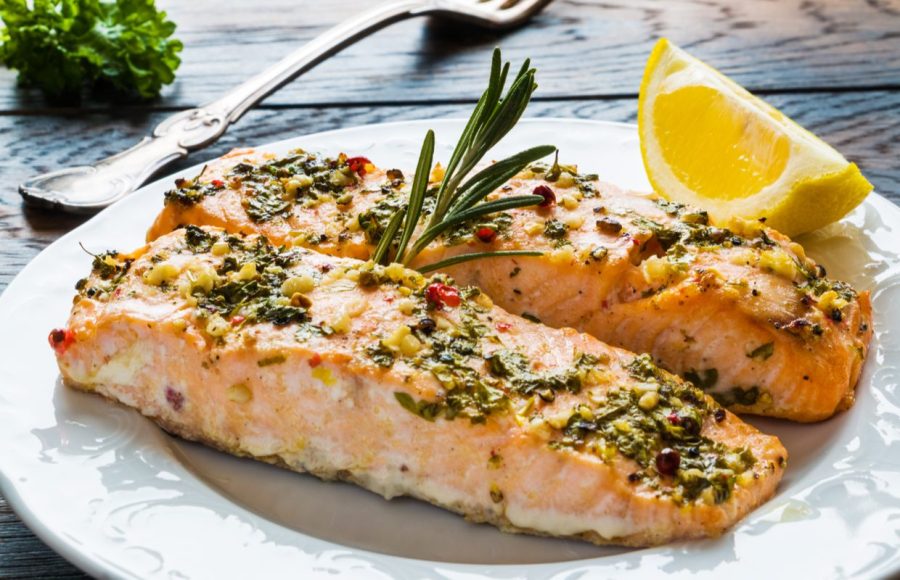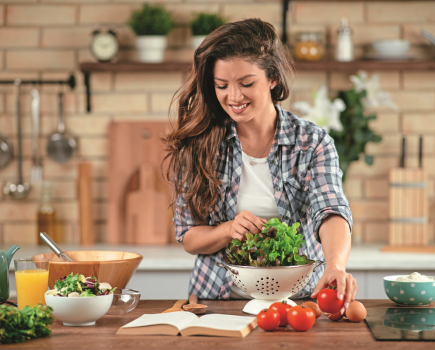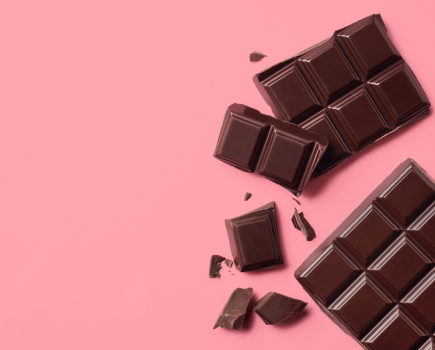Give your brain a helping hand with these tasty recipes that are rich in brain-boosting nutrients, including omega-3, lycopene, beta-carotene and more…
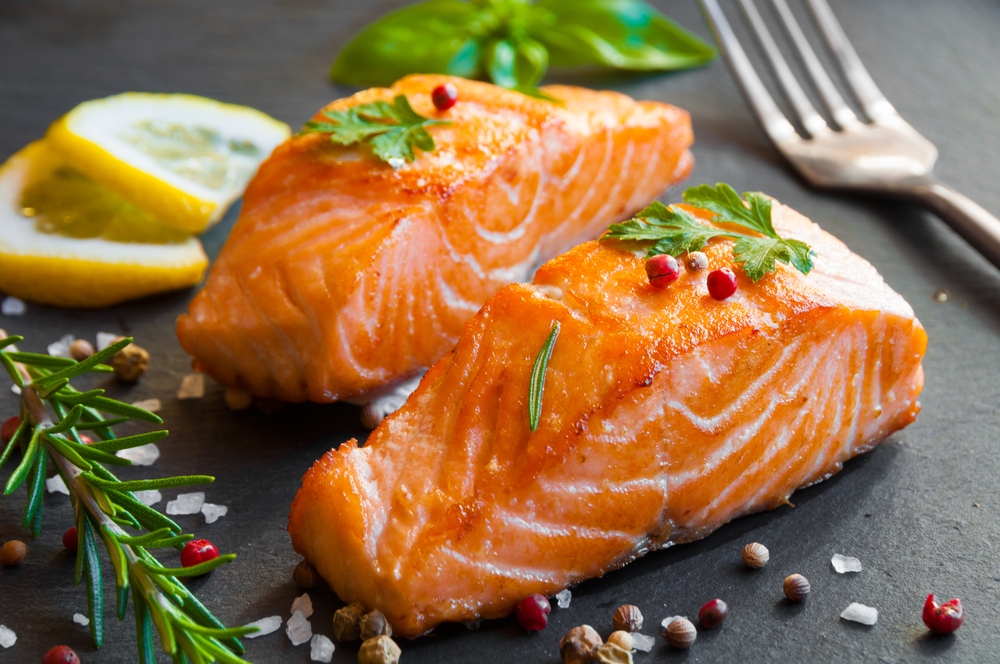
Salmon with black lentils and roasted cauliflower
A simple combination of a pulse, such as black lentils, combined with a roasted vegetable and a protein can be nutritionally satisfying as well as luxurious. Salmon recipes are also rich in brain-boosting omega-3, too.
Serves 4
Preparation and cooking time: 50 mins
Per serving: 458kcal, 24.9g fat – 5.4g saturates – 25.4g carbs, 4.3g sugars, 34.4g protein, 12.6g fibre, 0.6g salt
Ingredients:
- Black lentils 250g, rinsed
- Cauliflower florets 450g
- Olive oil 3tbsp
- Salmon fillets 4 125g each, pin-boned
- Lemon 1, juiced
- Dijon mustard 2tsp
- Salt
- Freshly ground black pepper
- Spring onions 2, sliced
- Flat-leaf parsley handful
Method:
- Preheat the oven to 200C/gas 6.
- Place the lentils in a saucepan and cover with at least 5cm water. Bring to the boil and cook steadily for 5 mins, skimming away any scum. Reduce to a simmer until tender to the bite, about 20-25 mins.
- In the meantime, toss the cauliflower with 1tbsp olive oil and some salt and pepper to taste on a rimmed baking tray. Roast until golden-brown, about 30-35 mins.
- Drain the lentils when ready. Return to the saucepan, season with a little salt and pepper, and cover with a lid to keep warm.
- Arrange the salmon on a roasting tray. Drizzle with 1tbsp olive oil and season. Roast alongside the cauliflower until firm to the touch and opaque, about 10-12 mins.
- Remove the cauliflower and salmon from the oven when ready. Whisk together the remaining 1tbsp olive oil with 1tbsp warm water, the lemon juice, mustard, ¼tsp salt, and 1/8tsp pepper in a small bowl.
- Divide the lentils, cauliflower, and salmon between plates. Spoon over the dressing
and garnish with spring onions and parsley before serving.
Benefits of omega-3 for brain health
Your brain consists of about 60 per cent fatty acids, with more than two-thirds of that being DHA. Studies show that essential fatty acids such as DHA improve neurological development in the brain. Luckily, salmon recipes are packed with dietary DHA, making them an excellent choice for a brain-boosting meal.
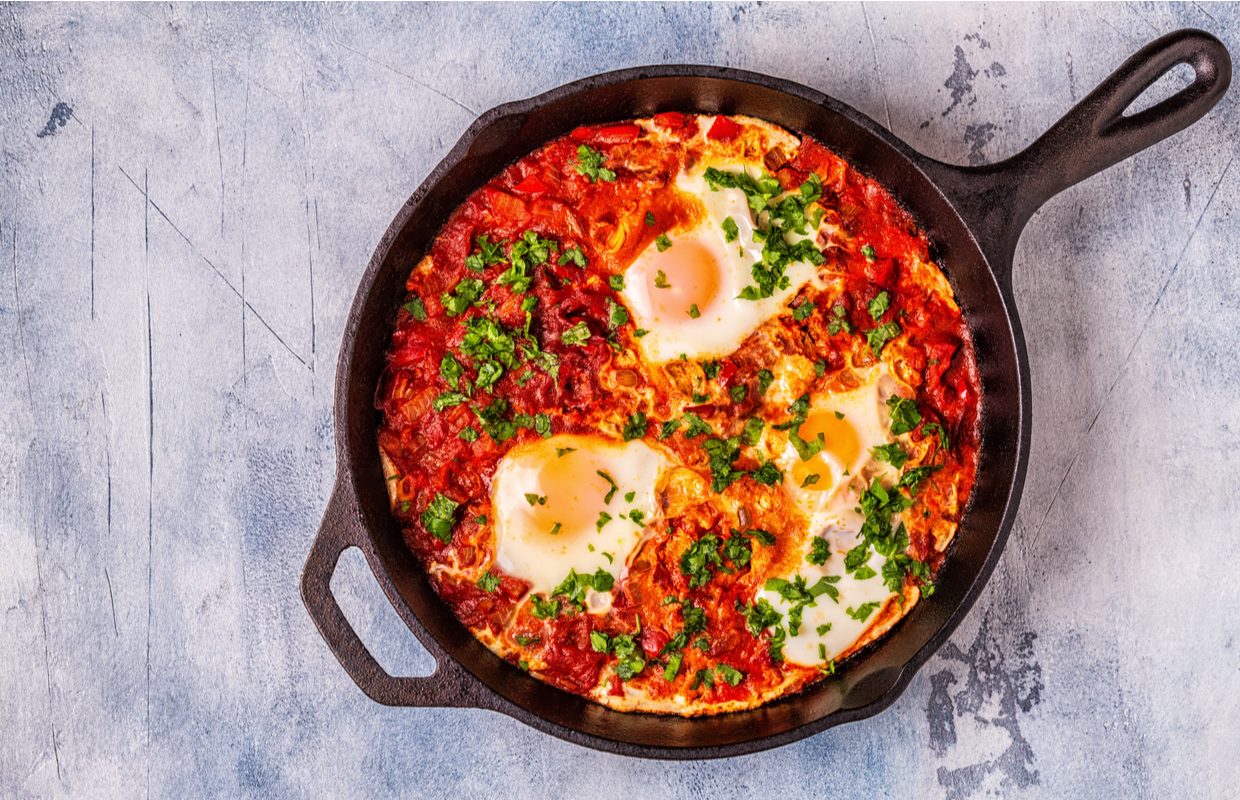
Shakshuka
This brain-boosting recipe is a simple supper or brunch that can be assembled with cupboard and fridge essentials. For best results, use the freshest eggs possible and adjust or omit the cayenne pepper as needed.
Serves 4
Preparation and cooking time: 40 mins
Per serving: 216kcal, 14.4g fat – 3.3g saturates – 10.4g carbs, 6.3g sugars, 11.4g protein, 1.6g fibre, 0.4g salt
Ingredients:
- Olive oil 2tbsp
- Large onion 1, finely chopped
- Red pepper ½, cored, seeded, and diced
- Garlic 3 cloves, finely chopped
- Small red chilli 1, finely chopped
- Ground cumin 2tsp
- Ground coriander 1tsp
- Paprika 1tsp
- Ground cinnamon ¼tsp
- Cayenne pepper pinch (optional)
- Tinned chopped tomatoes 400g
- Small eggs 8
- White wine vinegar 2tbsp
- Flat-leaf parsley handful, chopped
- Salt
- Freshly ground black pepper
Method:
- Heat the oil in a sauté pan set over a medium heat until hot.
- Add the onion, red pepper, garlic, chilli, and a generous pinch of salt, sweating until soft and golden, about 10 mins.
- Stir in the spices, omitting the cayenne if desired, and cook for a further 1-2 mins.
- Stir in the tomatoes and 200ml water. Bring to the boil, then reduce to a simmer until thickened, stirring frequently.
- When ready, season to taste. Cover and keep warm off the heat.
- Bring a large saucepan of water to a steady simmer. Crack four eggs into cups and stir the vinegar into the water.
- Slide the eggs into the water and poach at a steady simmer, adjusting the heat as needed, until set, about 3 mins. Remove from the water to a plate lined with kitchen paper to drain. Repeat for the other eggs.
- When ready to serve, reheat the shakshuka if needed.
- Divide the mixture between bowls and top with two poached eggs and some chopped parsley.
Brain boosting benefits of tomatoes:
Tomatoes are one of the easiest and cheapest ways to increase your intake of brain-protecting nutrients lycopene and beta-carotene. These eliminate free radicals that can affect healthy brain function.
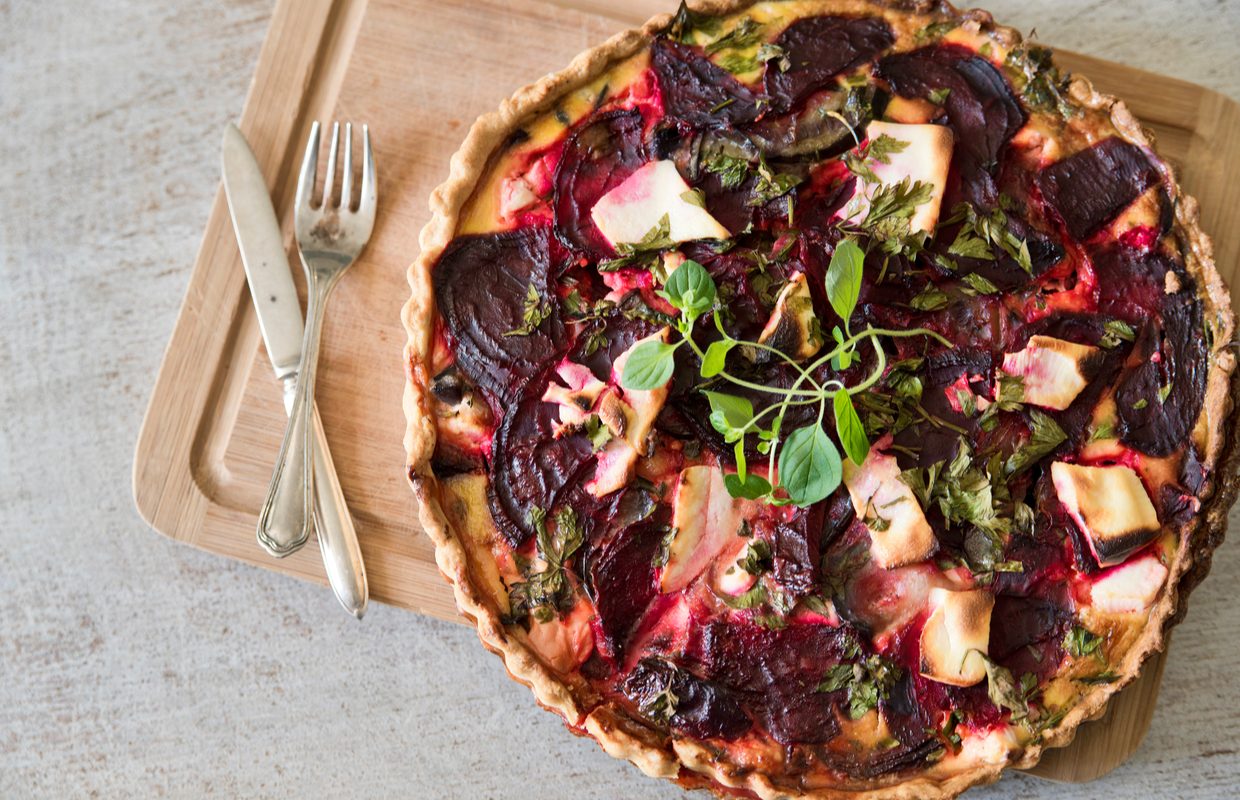
Mini polenta quiche with beetroot, chard and kale
This brain-boosting quiche is a twist on the classic recipes, with a lighter filling studded with nutrient-rich kale and chard.
Serves 6
Preparation and cooking time: 1 hour 30 mins
Per serving: 391kcal, 19.0g fat – 3.4g saturates – 45.0g carbs, 4.3g sugars, 12.6g protein, 5.9g fibre, 0.5g salt
Ingredients for the pastry:
- Wholemeal flour 225g plus extra for dusting
- Fine polenta 90g
- Salt ½tsp
- Olive oil 7tbsp
Ingredients for the filling:
- Baby beetroot 12, scrubbed
- Medium eggs 6
- Unsweetened almond milk 150ml
- Curly kale 150g, thick stems removed, leaves chopped
- Chard 100g, roughly chopped
- Salt
- Freshly ground black pepper
Method:
For the pastry:
- Blitz the flour, polenta, and salt in a food processor. Add the olive oil and about 3tbsp cold water, pulsing until a dough forms; you may need to add a little more water to bring it together.
- Turn out, gather into a ball, and divide into six. Working one by one, roll out into ½cm thick rounds and use to line the base and sides of mini quiche or tartlet tins; trim away any excess overhanging pastry.
- Prick the bases all over with a fork and chill until ready to fill.
For the filling:
- Preheat the oven to 180C/gas 4.
- Parboil the beetroot in a saucepan of salted, boiling water until tender to the tip of a knife, about 20 mins. Drain when ready and refresh in iced water. Drain again, pat dry, and cut in half.
- Whisk together the eggs and milk in a mixing bowl with ½tsp salt and ¼tsp black pepper.
- Transfer the lined quiche tins to a rimmed baking tray. Ladle the egg mixture into the pastry and arrange the beetroot, kale, and chard in them.
- Bake until the pastry is cooked through and the filling is set and golden brown on top, about 30 mins.
- Remove from the oven and let cool briefly before serving.
Brain-boosting benefits of egg recipes:
Eggs are one of the most complete foods you can eat. They contain high levels of vitamin B12, an essential vitamin also known as choline. A 2013 comparative study in the British Journal of Nutrition linked higher intakes of dietary choline to better memory skills.
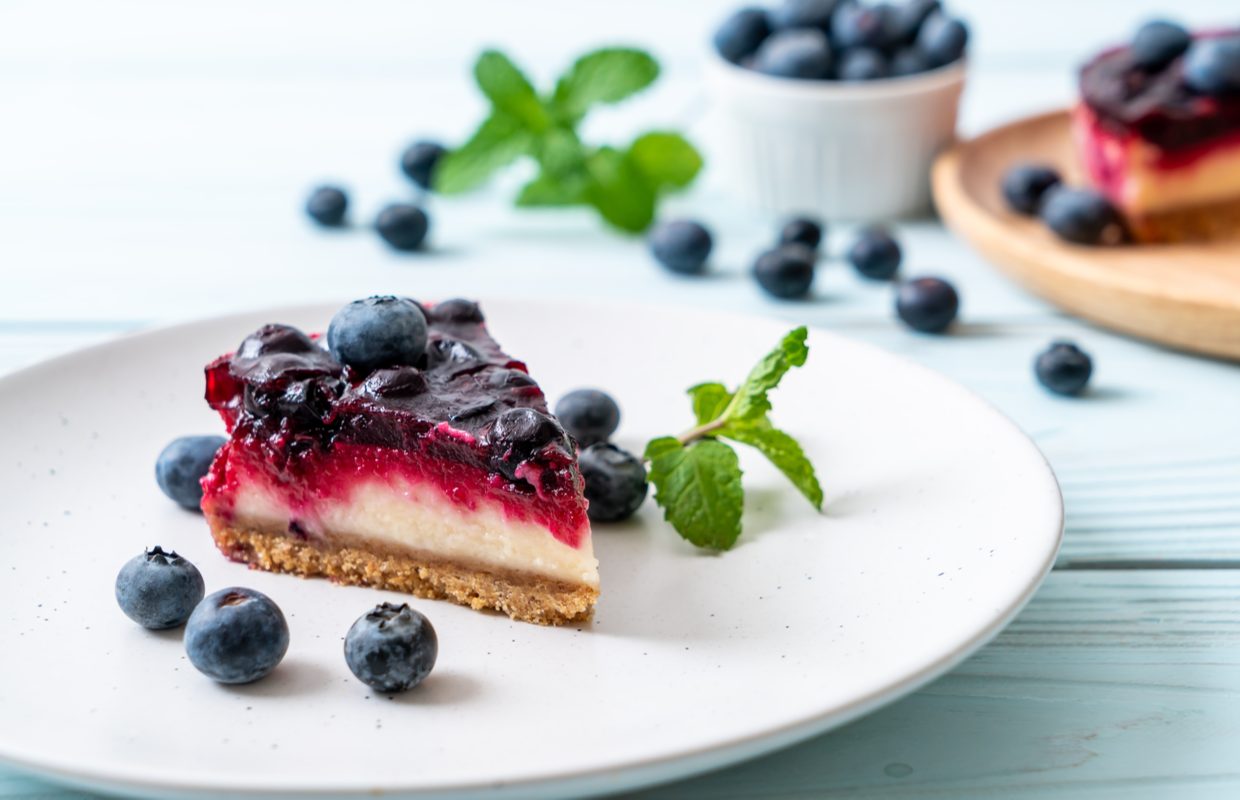
Blueberry cheesecake
This version of a cheesecake is lightened by using whipped egg whites and flavoured with naturally sweet blueberries.
Serves 12
Preparation and cooking time: 2 hours 45 mins. Chilling time: 8 hours
Per serving: 257 kcal, 15.5g fat – 6.9g saturates – 17.4g carbs, 6.9g sugars, 12.8g protein, 7.0g fibre, 0.2g salt
Ingredients for the base:
- Almond flour 200g
- Raw coconut oil 60g, melted
- Granulated stevia 2tbsp
- Vanilla extract 1tsp
Ingredients for the filling:
- Large egg whites 6
- Salt pinch
- Large egg yolks 3
- Granulated stevia 100g
- Vanilla extract 1½tsp
- Lemon juice 1tsp
- Extra-light cream cheese 675g, at room temperature
To serve:
- Blueberries 250g
Method:
For the base:
- Preheat the oven to 180C/gas 4. Stir together all the ingredients for the base in a bowl until combined. Pack the mixture into a 20cm springform cake tin, smoothing flat with the back of a tablespoon.
- Bake until golden and dry to touch, about 15 mins. Remove to a rack to cool. Increase the oven to 200C/gas 6.
- Beat together the egg whites and salt until stiffly peaked. Set aside.
- Beat together the egg yolks, stevia, vanilla extract, and lemon juice in a separate mixing bowl until pale and thick, about 2-3 mins. Beat in the cream cheese in three additions until fully incorporated.
- Fold in the egg whites in three or four additions until fully incorporated. Spoon the mixture into the tin, gently rapping the tin to help it settle.
- Bake for 10 mins before reducing the oven to 150C/gas 2 and baking until set on top, about 40-50 mins. Turn off the oven and let the cheesecake cool in the oven for 1 hour.
- Remove to a wire rack and let cool before covering and chilling overnight.
- To serve: The next day, carefully turn out the cheesecake. Purée half the blueberries in a food processor and spread on top of the cheesecake.
Decorate with the remaining blueberries before slicing and serving.
Brain-boosting benefits of blueberry recipes:
Blueberries have long been prized as an antioxidant-laden superfood, which help mop up oxidative stress to keep your brain in good shape.
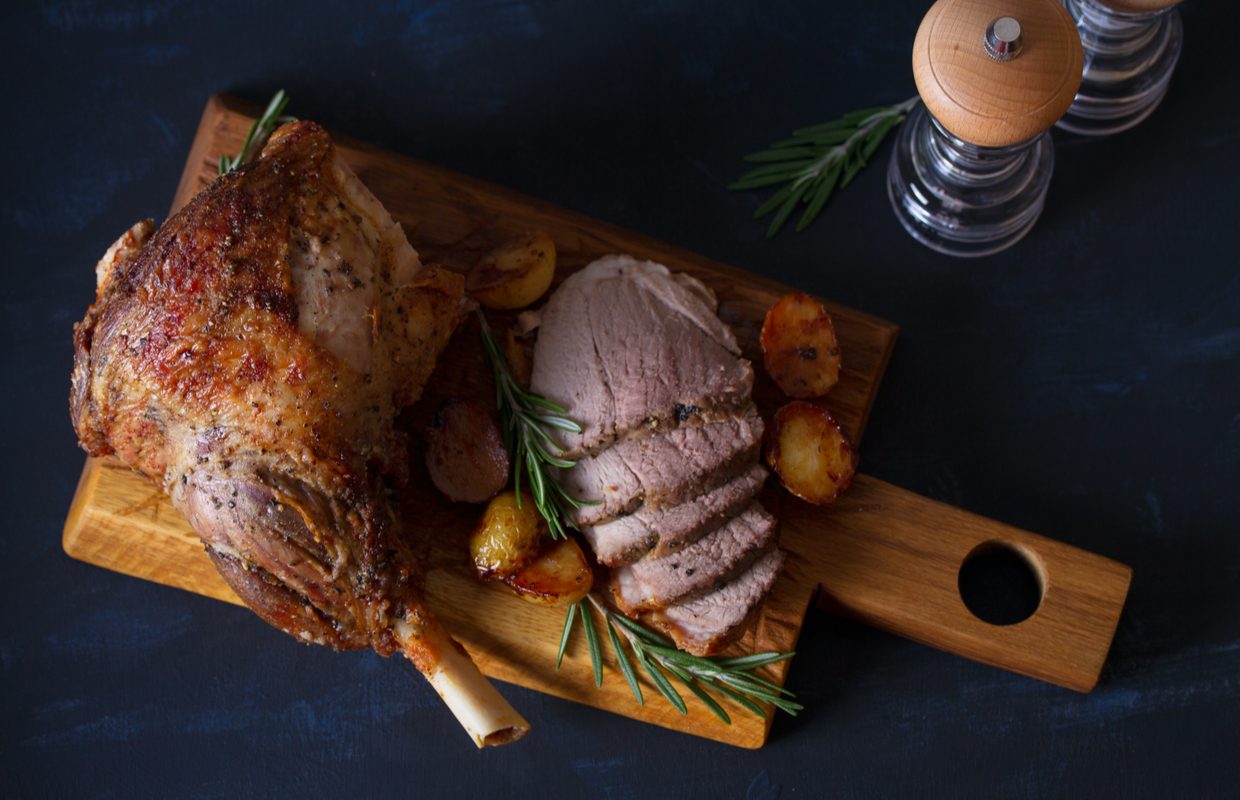 Leg of lamb in sage butter with walnuts
Leg of lamb in sage butter with walnuts
This impressive dish is surprisingly easy to get from kitchen to dinner table; just 15 minutes of prep and it’s in the oven. Pair with some roasted root veg for a complete meal.
Serves 8
Preparation and cooking time: 2 hours
Per serving: 423kcal, 22.7g fat – 9.0g saturates – 3.1g carbs, 0.6g sugars, 50.5g protein, 1.7g fibre, 0.4g salt
Ingredients:
- Leg of lamb 1.5kg, on the bone, trimmed
- Raw coconut butter 3tbsp
- Garlic 3 cloves, roughly chopped
- Sage leaves 50g
- Walnuts 80g
- Salt and black pepper
Method:
- Preheat the oven to 180C/gas 4. Pat the lamb dry with kitchen paper and season well. Place in a roasting tray.
- Combine the coconut butter, garlic, two-thirds of the sage leaves, and the walnuts in a food processor. Pulse the ingredients until just loosely broken up.
- Smear the mixture onto the lamb and scatter the remaining sage leaves over the top.
- Roast until golden brown, basting from time to time, until the thickest part registers at least 60C/140F on a meat thermometer (about 1 hour 15-30 mins).
- Remove the lamb from the oven and cover loosely with aluminium foil, letting it rest for at least 10-15 mins before carving.
Benefits of walnuts and sage:
Walnuts and sage make for a formidable brain-boosting combo in recipes. Recent studies have shown possible links between walnuts and improved memory; and between sage and Alzheimer’s prevention.

